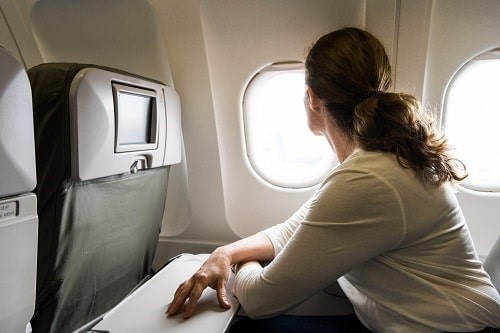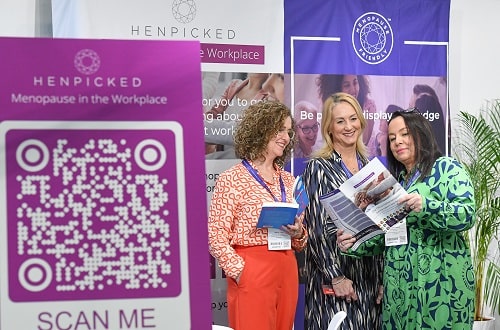Supermodel Naomi Campbell claims she has the secret to flu-free flying. Is she being a diva or can we divine some truth in her advice?
Features
Take a holiday from colds and flu this Christmas
On the face of it, the aeroplane seems a particularly ripe environment for germs. Last September, an Emirates airline flight from Dubai was quarantined after around 100 passengers and crew reported feeling ill after catching bugs from infected passengers.
Research has also confirmed that if you’re unlucky enough to be sitting near someone who has flu, or a cold, it’s likely you could get ill. Research paper Influenza Transmission on Aircraft, published in August 2016 in Epidemiology, found that 42 per cent of travellers who caught flu after flying had been sitting within two rows of a flu sufferer.
Yet, although getting ill might be a hazard of air travel, it's not inevitable, which could be good news for the 710,000 people who travel out of the UK each month for work, or for those looking forward to their holiday breaks.
Come fly with me
On her YouTube video, viewed over 1.8 million times, supermodel, Naomi Campbell shares her own tips for a healthy flight. “Clean everything you touch, anything you put your hands on,” she says as she applies Dettol wipes to the roof, arm rest and TV screen. “As much as I travel, I should get sick so much more with colds and stuff, and I’m blessed that I don’t. I really think that this helps me, my little routine.” Coming from someone as radiant as 49-year-old Campbell, the ideas have power to convince. But what is the scientific basis for her concerns and what do the experts say about her solutions?
 Naomi Campbell says her in-flight routine saves her from getting ill. Photograph: YouTube
Naomi Campbell says her in-flight routine saves her from getting ill. Photograph: YouTube
Professor Miryam Wahrman is a microbiologist at William Paterson University in New Jersey. She says she has done studies showing how efficiently germs can be transferred, even when they have left the individual: “We can easily transfer germs like viruses and bacteria from fabrics to hands and from fabrics to fabrics, or from fingers to hard surfaces and to cloth.”
She says Campbell is on the right track using the alcohol-based wipes, and for those not travelling first class where areas could be less clean, it’s even more applicable. “As a person who travels coach where you’re really squished in between people, you’re forced to touch everything, so there is justification for cleaning up a bit before getting on your seat in the plane. Any surface that someone else has touched could harbour germs.”
Bacteria have a long shelf life: “We did an experiment running for a month and some bacteria were still healthy and hardy – they can sit on surfaces for weeks, even months,” she explains. Outside the body, flu viruses can stay active for up to 24 hours. Cold viruses can survive on surfaces as long as a week.
Danger zones
There are specific places on the plane that attract germs, Wahrman adds. Think of the seatbelt, which so many hands before yours have touched, or the door of the toilet. In her book The Hand Book: Surviving in a Germ Filled World, Professor Wahrman describes how parents sometimes change their babies’ nappies on the fold-down table. “You don’t know what’s been on the table, it’s not just lunch,” she cautions. As studies show as many as 20 to 30 per cent of people don’t wash their hands after using the bathroom, she adds it’s important to be aware what some of these surfaces may hold. “People are not as vigilant as maybe you think they are,” she says.
 We can easily transfer germs like cold and 'flu viruses via fingers touching the plane's surfaces
We can easily transfer germs like cold and 'flu viruses via fingers touching the plane's surfaces
In fact, Canada’s consumer watchdog recently did tests on 18 short-haul flights. Scientists took 100 samples from the seatbelt, tray table, headrest, seat pocket and washroom handle to look for types of bacteria, such as E. coli, as well as yeast, mould and other pathogens. Yeast and mould were detected on the majority of the 18 flights. They said this suggested the surfaces were either not cleaned well or often enough in between flights.
You can reduce your risks of infection by being ‘germ aware’ and washing your hands before you eat, advises Wahrman. “Just remember and keep in mind the things you’re touching in the environment and that way you can wash your hands before you touch your eyes, your nose, or your mouth,” she says.
Irritating air
In the YouTube video Campbell puts on a face mask, which she claims protects her from the increased coughing and sneezing that can happen on planes. It’s possible that people do cough more due to the drier air on board. According to the World Health Organization (WHO), humidity in aircraft cabins is usually less than 20 per cent.
“We like at least 40 per cent humidity to be comfortable. Less than that, your eyes get dry and irritated, particularly if you wear contact lenses and your throat gets dry,” says Allen Parmet, an aerospace medicine consultant, speaking to science news site The Verge.
The increased coughing and sneezing could also increase the travel of germs and Professor Wahrman says that the mask is a wise option in some cases: “The airplane is a closed container and all of the inhabitants are breathing the air. It’s filtered but there’s a higher risk of transmitting germs through coughing and sneezing.”
For many of us who worry it might look socially awkward to travel wearing a mask, it could be nonetheless handy to have if there’s a person suffering a cold nearby and “you’re kind of stuck there,” she adds. “It’d be good to have a mask in your pocket to use to protect yourself from that person.”
 Our bodies need moisture to fight bacteria, so drinking enough water on airplanes is essential
Our bodies need moisture to fight bacteria, so drinking enough water on airplanes is essential
Our bodies need moisture
Campbell also carries a water bottle, which is common enough but what’s less commonly known is that hydration is key to fighting illness in the dry plane environment. About 50 per cent of the air circulating in the cabin is pulled from the outside, and at high altitudes this outside air is almost completely devoid of moisture.
Yet, our bodies need moisture to fight bacteria, using the primary innate defence mechanism of the lung called mucocillary clearance. This refers to the process whereby little hairs in the nose trap viruses and bacteria when we breathe, which are then swallowed and destroyed by acid in the stomach.
Dr Preethi Daniel, clinical director at London Doctors Clinic, explains: “Under low humidity, studies have found ciliary cells decrease their activity, and clearance slows, potentially allowing for bacterial infection.” In her interview for the Daily Telegraph (3 August 2019) she recommends using Vitamin C, D and zinc supplements, as well as moisturising nasal sprays to maintain humidity in the nose to aid the functioning of the ciliary system. Professor Wahrman concurs: “Drinking is really essential, so you should stay hydrated because it keeps your mucus membranes in your nose moist and helps you to ward off germs you might inhale.”
While these tips are all helpful, it’s also wise to keep a healthy dose of perspective. Sometimes it can be good to be exposed to germs because it gives our immune systems something to fight. “There’s something to be said for being exposed to some germs and stimulating your immune system,” says Wahrman.
However, when the body is under the added strain of the unnatural and dry environment of the plane, not to mention factors such as stress and jet lag, it could be sensible to take on board some of Campbell’s suggestions. Unfolding a brightly coloured rug she has packed for her seat, for her wellbeing as much as for germ protection, it’s hard not to admire the model’s commitment to doing what works for her. “This is what I do on every plane I get on, I do not care what people think of me. It’s my health and it makes me feel better.” And who can argue with that?
Naomi Campbell’s flight tips are on YouTube here
FEATURES

Why line managers play a vital role in workplace wellbeing
By Marcus Herbert, British Safety Council on 03 September 2023
The behaviours of line managers can have a positive or negative impact on employee health, wellbeing and engagement, so it’s vital managers get staff feedback on whether their management style is supportive or negative, and have regular check-ins so workers can raise concerns about their wellbeing.

Watercooler Event to hone in on eight trends in employee health and wellbeing
By Claire Farrow, Make a Difference Events & Media on 15 April 2024
The free-to-attend Water Cooler Event at ExCeL London on 23–24 April will see more than 6,000 workplace experts coming together to explore the latest thinking, solutions and best practice for supporting and boosting employee wellbeing, diversity and workplace culture.

Sedentary working and how to combat the ‘sitting disease’
By Gavin Bradley, Active Working on 05 April 2024
Prolonged and excessive sitting poses a major risk to our health, but the Get Britain Standing campaign and On Your Feet Britain Day on 25 April are a great way of encouraging workers to sit less and move more.



